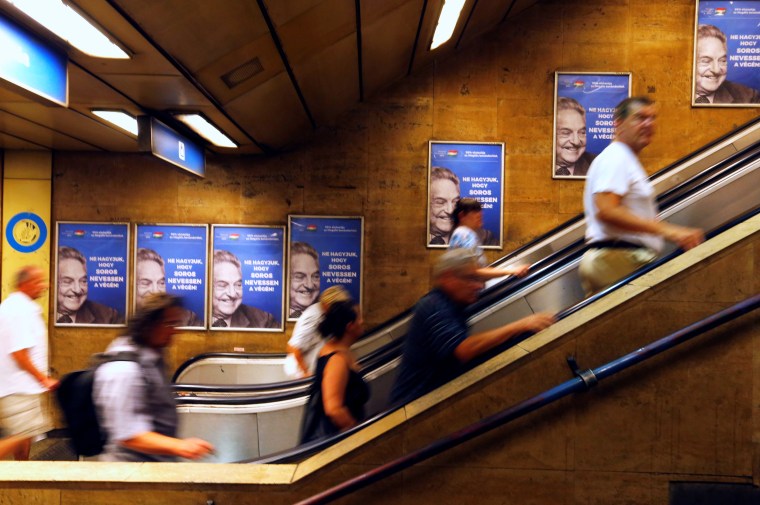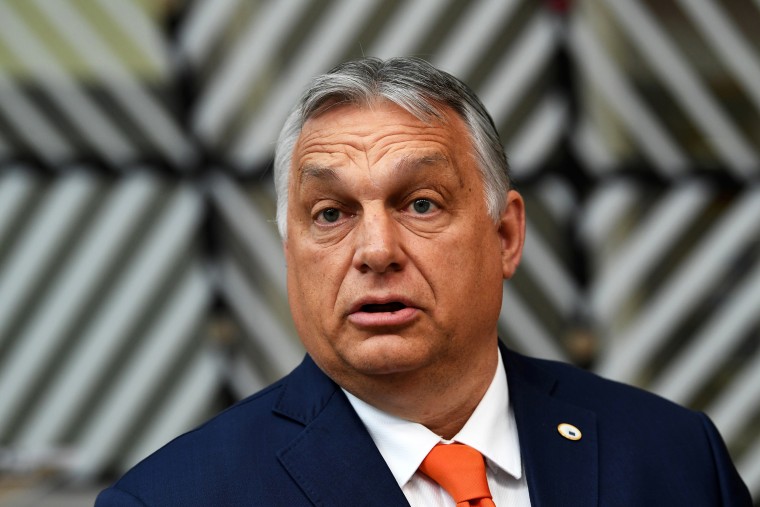Pope Francis called for an end to antisemitism Sunday during an unusually short trip to Hungary, where he warned that prejudice against Jews was a "fuse that must not be allowed to burn."
"I think of the threat of antisemitism still lurking in Europe and elsewhere," the pope said at an ecumenical meeting of Christian and Jewish leaders in the capital, Budapest.
"This is a fuse that must not be allowed to burn. And the best way to defuse it is to work together, positively, and to promote fraternity," he said.
Download the NBC News app for breaking news and politics
Francis, on his first international outing since he had intestinal surgery in July, spent seven hours in Budapest, where he presided over a lengthy Mass for a crowd that organizers said reached 100,000 people, before he moved on to a four-day tour of neighboring Slovakia.
He met briefly with Hungary's populist prime minister, Viktor Orbán, whose hard-line policies on refugees clash with Francis'. The pope has previously said migrants and refugees seeking better lives in Europe should be welcomed. He has also criticized what he has called "national populism" advanced by governments like Hungary's.

Orbán, who has been in power since 2010, upset Hungary's Jewish community in 2017 when he used an image of the U.S. financier George Soros, who is Jewish, in an anti-immigration campaign. At the time, he rejected calls from the Jewish community to take the posters down.
Under Orbán's leadership, Hungary approved a law to force a university founded by Soros out of the country, despite widespread condemnation at home and abroad. Orbán had claimed that Central European University violated regulations in awarding diplomas, an allegation the school rejected.
Orbán was also widely criticized for his comments at rally in March 2018, when he told supporters: "We are fighting an enemy that is different from us. ... Not open, but hiding; not straightforward, but crafty; not honest, but base; not national, but international; does not believe in working, but speculates with money; does not have its own homeland, but feels it owns the whole world."
Orbán has repeatedly rejected accusations of antisemitism. He said in May that they were "ridiculous," and he said Hungary was a "more than fair and correct country in that respect," Reuters reported.
Orbán has also maintained that Jews should feel safe under his government, which he said has "zero tolerance" for antisemitism.

After the meeting, Orbán wrote on Facebook that he had asked the pope "not to let Christian Hungary perish."
Ira Forman, a senior adviser for combating antisemitism at Human Rights First, said in a phone interview Sunday that he believes Orbán's past comments were clearly antisemitic.
"Orbán's a smart guy. He knows his history, and yes, he knew what he was doing," he said. "The whole Soros campaign was chockablock with antisemitic allusions."
Gabor Kalman, the president of the Bet Orim Reform Jewish Congregation in Hungary, who attended Sunday's meeting with Francis, said he does not believe Orbán is responsible for fueling antisemitism in Hungary.
While he said he does believe antisemitism is a growing problem, he said: "I am convinced, and the leadership of my congregation also believe, that antisemitism doesn't stem from the current leadership."
Rather, he said, he believes it is a prejudice that has been passed down for generations in Hungarian society at the community level.
In May, Human Rights Watch warned of an increase in reported hate incidents from Jews in many European countries. The organization said Jews in Europe were feeling "increasingly unsafe" in the swirl of reports of synagogues' being defaced and attacked.
The Anti-Defamation League also recorded a surge in verbal and physical attacks against Jews in North America, Europe, the Middle East, South Asia and North Africa after an outbreak of fighting between Israel and Gaza's militant Hamas rulers this year.
